7 Scary House Noises That Signal Actual Problems
Experts share insight on which ones need to be taken care of immediately.
When it comes to your home, ambiance is everything, from the furniture and decor to the paint colors and materials. But in addition to it looking beautiful, your house should, more importantly, be safe. And one of the ways you can be alerted to something unsafe is by the scary noises in your home. Whether you live in an older house or one that's brand new, hearing anything like loud banging, gurgling pipes, or scratching sounds can be cause for concern.
"Listening and acting quickly is fundamental if your home is 'speaking' to you with these odd noises," says Carol Wilson, home decor writer at You Comfort. Luckily, Wilson and other experts identified seven noises that could signal actual problems. Read on to find out what the sounds might mean and if you'll need to call a professional.
RELATED: 5 Ways Your Home's Carpeting Can Make You Sick.
1
Loud banging or clanking noises

The first scary noises to be aware of are loud banging or clanking. If you hear these, specifically when you turn your water on and off, you're most likely dealing with a situation known as water hammer—and you need to address this right away.
Todd Saunders, CEO of FlooringStores, says those banging sounds indicate hydraulic shock in your pipes, which is the result of rapid pressure buildup. If you don't consult a plumber, you may risk damage to the pipework. "In extreme cases, this can even lead to ruptured pipes and water damage in your home," he adds.
While these noises are of high urgency, Courtney Klosterman, home insights expert at Hippo, points out that there are situations where banging sounds are normal. "People in apartment buildings can hear loud banging noises when water hammer occurs, and this can happen in shared plumbing systems between units when there is a sudden and abrupt stop or change in the flow of water."
If the clanking persists after turning off the system and attempting basic troubleshooting, then you should seek out professional help.
RELATED: I'm a Property Expert and These Are the 5 Things That Devalue Your Home.
2
High-pitched ringing or buzzing
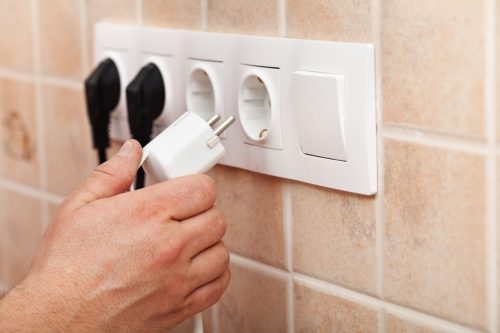
High-pitched ringing or buzzing signals electrical issues and should not be taken lightly. "This could indicate a malfunctioning electrical outlet or a faulty electrical appliance," says Wilson, who adds that if it's not addressed promptly, it can lead to electrical fires.
If you hear this at any point, it's crucial to identify where it's coming from as soon as possible. Try unplugging any appliances to see if the sound stops. If it doesn't, or you can't pinpoint exactly where it's coming from, then it's time to call the electrician.
Klosterman also says to turn off all the circuit breakers as a precautionary first step and look for any visible signs of electrical damage, such as flickering lights or burn marks.
RELATED: 6 Mistakes You're Making That Are Increasing Your Water Bill, Experts Say.
3
Hissing or running water sounds
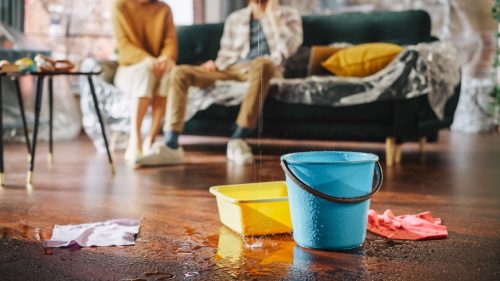
While hissing or running water sounds aren't as urgent as banging or high-pitched noises, they can indicate leaks or plumbing problems—and water damage can become costly if it's not addressed promptly.
"Watch for any unusual increases in water usage either on your water utility bill or water meter that could indicate a problem," advises Klosterman, who adds that you should also inspect any exposed pipes or fixtures for signs of moisture or corrosion. Other leakage signs include peeling paint or wallpaper, as well as mold and mildew that gives off a musty smell.
If at any point you suspect leaks within walls or floors, getting assistance from a professional is the next logical step. However, Klosterman notes that if the hissing and running water noises are occasional and not accompanied by other problems, there might not be an immediate need to worry.
RELATED: 10 Surprising Things Attracting Bats to Your Home.
4
Gurgling or cracking noises
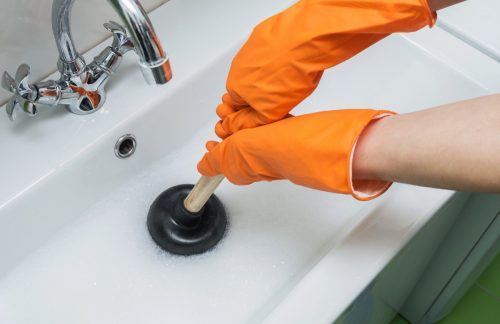
"Trying to find gurgling or cracking noises can be difficult as it seems to come from everywhere all at once," points out Stacy Brown, director of technical training at Real Property Management, a Neighborly company. These sounds most often come from the plumbing system and can indicate problems with water flow or air issues in the pipes.
Brown says that many times this can be an indication of a clog starting, which can cause a backup. Again, any water damage can be pricey, so it's important to take action quickly. You should identify the source first and determine which fixtures or pipes are actually making noise. Once that's done, Klosterman suggests checking toilets or sinks for blockages as well as looking for water backflow in showers or tubs.
"When the noises are not limited to a single fixture or area but affect multiple fixtures, drains, or pipes throughout your home, seek out a professional, advises Klosterman. And be alert if the noises become louder and more frequent.
RELATED: 7 Common Mistakes That Can Make Your Electric Bill Soar, Experts Say.
5
Gurgling noises in drains
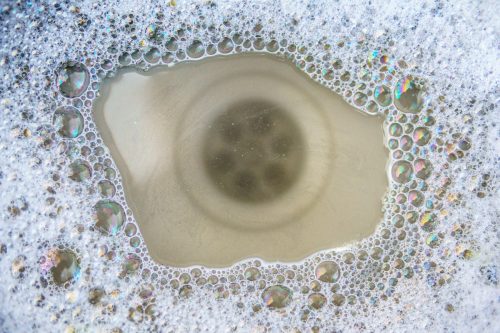
Gurgling noises from drains can be a sign of poor drainage, venting issues, or larger problems within a plumbing system, says Klosterman. There may be something stuck in the drain or even a root intrusion from trees outside in the sewer line.
"Many times, this can also be attributed to pouring pasta water or grease down the drains, a hair clog, or some other foreign object such as toothbrushes, toys, or clothing," says Brown.
Ultimately, you have to find out which drains are producing the gurgling noises by inspecting them for any visible blockages and debris. Slow drainage, standing water, or poor plumbing ventilation can all lead to this sound, says Klosterman. Calling in a plumber can help solve the problem.
RELATED: 24 Small Ways You're Making Your Home More Dangerous.
6
Screeching dryer vents
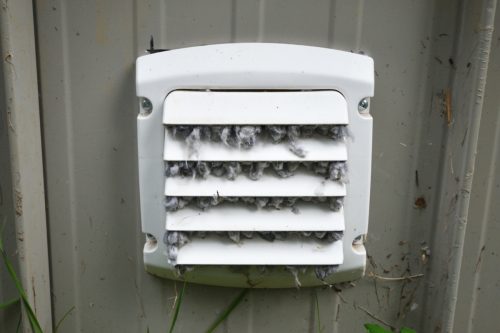
Not only does a screeching dryer vent signal potential dryer inefficiencies or malfunctions, but it also can be a huge fire hazard. "If your dryer is screeching and is warm or hot to the touch, turn it off and unplug it immediately," Brown tells Best Life.
The screeching occurs when the lint buildup or reduced airflow causes the dryer to overheat—which can lead to a fire. Therefore, it's best to leave it to a company that specializes in clearing not only the dryer vent but also the dryer itself.
Klosterman adds that the noise can also be attributed to problems with the belt or other components: "Carefully examine the dryer belt for wear, fraying, or damage [as] a damaged dryer belt can cause screeching during operation."
RELATED: 5 Items You Should Never Store in Your Pantry, According to Experts.
7
Scratching, rustling, or thumping in the walls or attic
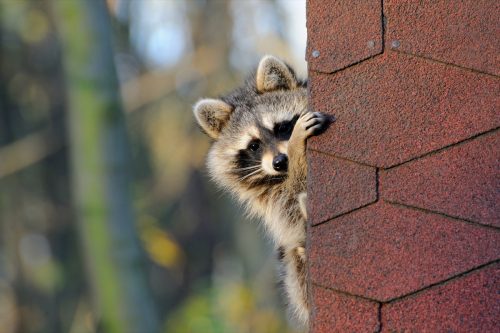
Any of these noises can be due to the presence of insects and animals, according to Brown, but she mentions that they can also be from tree branches on the roof, an air vent that is wearing out and needs to be greased or replaced, or a chimney cap or skylight that is loose and moving with the wind.
If scratching, rustling, or thumping in the walls or attic is left unaddressed, you'll likely have to deal with more significant repair problems, such as damage to the structural aspects of your home as well as issues with electrical wiring and insulation.
It's crucial to pay attention to where the sounds are coming from and how frequently they are occurring. You should also be looking for gaps and openings where pests might have the opportunity to invade your home.
For more home advice sent directly to your inbox, sign up for our daily newsletter.






















